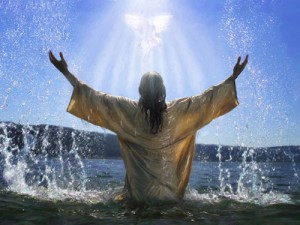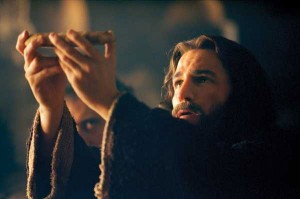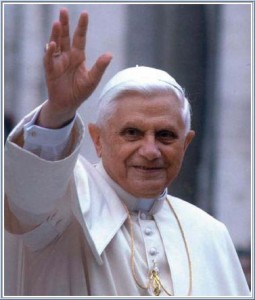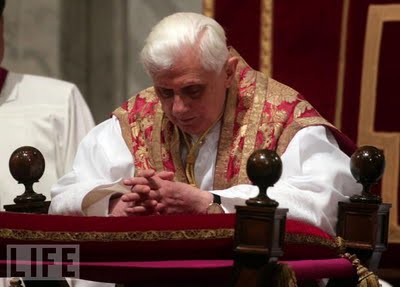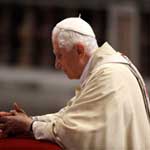 Episode 1 -Baptism: Born from Above– The significance of Jesus’ baptism.  The ministry of parenthood.  The role of the father.
Episode 1 -Baptism: Born from Above– The significance of Jesus’ baptism.  The ministry of parenthood.  The role of the father.
[powerpress]
Deacon James Keating, PhD, the director of Theological Formation for the Institute for Priestly Formation, located at Creighton University, in Omaha, Nebraska.
Deacon Keating takes a careful look at the Baptismal Rite and offers prayerful reflection and insight to help us live out the faith and nurture the domestic church.
From the Baptismal Rite for Children:
From the earliest times, the Church, to which the mission of preaching the Gospel and of baptizing was entrusted, has baptized not only adults but children as well. Our Lord said:
‘Unless a man is reborn in water and the Holy Spirit, he cannot enter the kingdom of
God.’ The Church has always understood these words to mean that children should not
be deprived of baptism, because they are baptized in the faith of the Church, a faith proclaimedfor them by their parents and godparents, who represent both the local Church
and the whole society of saints and believers: ‘The whole Church is the mother of all and the mother of each.’ To fulfill the true meaning of the sacrament, children must later be formed in the faith in
which they have been baptized. The foundation of this formation will be the sacrament
itself that they have already received. Christian formation, which is their due, seeks to lead
them gradually to learn God’s plan in Christ, so that they may ultimately accept for themselvesthe faith in which they have been baptized.
How can this be accomplished? Â What is the role of the parents, the godparents, the minister of baptism, the Church? These and other questions are reflected upon in “Baptism: Born from Above with Deacon James Keating”.
For more information on the “Institute of Priestly Formation†and for other material available by Deacon Keating, just click here
Don’t forget to pickup a copy of “Communion with Christ†, it is one of the best audio sets on prayer…ever!
Check out Deacon Keating’s “Discerning Heart†page
Tags: baptism, baptismal rite, catholic, catholic podcast, catholic prayer, cathollc spirituality, creighton university, Deacon James Keating, Deacon Keating, father, institute for priestly formation, mother
This entry was posted on Friday, July 22nd, 2011 at 6:56 am
You can follow any responses to this entry through the RSS 2.0 feed.
“Our One Great Act of Fidelity:  Waiting for Christ in the Eucharist” is a wonderful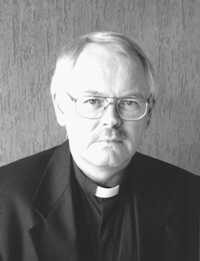 reflection on the many aspects the Eucharist touches our hearts and our lives.  I have read Fr. Ronald Rolheiser for many years in our local diocesans newspaper…what a delight to finally have the opportunity to speak to him, especially about this deeply personal book which  is not only
reflection on the many aspects the Eucharist touches our hearts and our lives.  I have read Fr. Ronald Rolheiser for many years in our local diocesans newspaper…what a delight to finally have the opportunity to speak to him, especially about this deeply personal book which  is not only 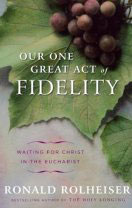 offers theological insights, but is a also spiritual and a personal statement of how Fr. Rolheiser understands the Eucharist and why he celebrates it every day.
offers theological insights, but is a also spiritual and a personal statement of how Fr. Rolheiser understands the Eucharist and why he celebrates it every day.
[powerpress]
You can find Fr. Rolheiser’s book here
Tags: catholic, catholic podcast, catholic prayer, cathollc spirituality
This entry was posted on Monday, July 11th, 2011 at 12:19 am
You can follow any responses to this entry through the RSS 2.0 feed.
Is Jesus Calling? A Spiritual Guide to Discerning Your Vocational Call with Fr. Paul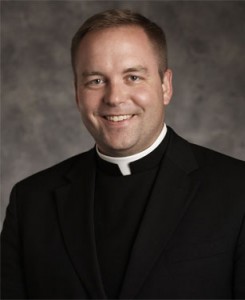 Hoesing – episode 6: The Eighth Spiritual Lesson: The will of the spirit against Christ is revealed in fear. “This spirit against Christ drives a man by a fear of something false. Â While the Spirit of Christ draws a man by a peaceful presence to something that is true.”
Hoesing – episode 6: The Eighth Spiritual Lesson: The will of the spirit against Christ is revealed in fear. “This spirit against Christ drives a man by a fear of something false. Â While the Spirit of Christ draws a man by a peaceful presence to something that is true.”
Questions: Does your fear come when you are desiring to do God’s wil and the the thought of you choosing not to do His wil causes your fear?  Or, rather, does your fear come when you are focused on what you want and the thought that God might want something different makes you afraid;  if so, identify that as the will of the spirit against Christ and turn away from it, inviting Christ into the situation by repeating a simple prayer like, “Jesus I trust in you!”
[powerpress feed]
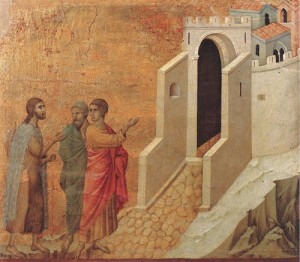 The Ninth Spiritual Lesson: You must stand firm in faith in what you received from God. “This is the essential choice.  If one dos not make this choice, his spiritual life will be the experience of a ping pong ball, bouncing back and forth, believing one desire one day and the opposite one the next.  He will be a confused man.”
The Ninth Spiritual Lesson: You must stand firm in faith in what you received from God. “This is the essential choice.  If one dos not make this choice, his spiritual life will be the experience of a ping pong ball, bouncing back and forth, believing one desire one day and the opposite one the next.  He will be a confused man.”
Questions: Do you have moments in prayer where the next step you are to take becomes quite clear from the experience of the peace of Christ, but then you believe and follow the thoughts ,  feelings and desires in the fear flowing from the spirit against Christ, causing your to change your mind and not move forward?  Identify those movements and cling to Christ during them by praying, “Jesus, I I trust in you.”
Based on “Is Jesus Calling You To Be A Catholic Priest: A helpful guide”, published by National Conference of Diocesan Vocation Director.
Fr. Paul Hoesing serves as the Vocation Director for the Archdiocese of Omaha, NE.
Check out “For Your Vocation.org“
Tags: archdiocese, catholic, catholic podcast, catholic prayer, catholic priest, cathollc spirituality, discernment, married life, priesthood, vocation discernment
This entry was posted on Friday, July 1st, 2011 at 8:52 pm
You can follow any responses to this entry through the RSS 2.0 feed.
JULY 2011 [powerpress = devotionals-prayers]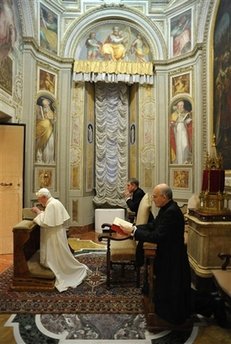
General Intention: That Christians may contribute to alleviating the material and spiritual suffering of AIDS patients, especially in the poorest countries.
Missionary Intention: For the religious who work in mission territories, that they may be witnesses of the joy of the Gospel and living signs of the love of Christ.
Tags: catholic, catholic podcast, catholic prayer, cathollc spirituality, holy father intentions, pope benedict xvi
This entry was posted on Friday, July 1st, 2011 at 2:33 pm
You can follow any responses to this entry through the RSS 2.0 feed.
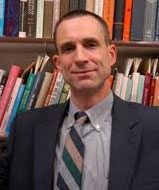 Episode 7- Blessed John Paul II – Fides et Ratio : Faith and Reason
Episode 7- Blessed John Paul II – Fides et Ratio : Faith and Reason
[powerpress]
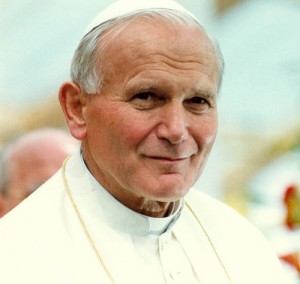 In this episode Dr. Reno examines Faith and Reason through Blessed John Paul II’s “Fides et Ratio”.
In this episode Dr. Reno examines Faith and Reason through Blessed John Paul II’s “Fides et Ratio”.
|
For an online version of “Fides et Ratio’ click here
“Christian Apologetics with Dr. R. R. Reno” explores numerous facets of faith and reason in the life of the Church and the world. Grounded on the work of giants, such as St. Thomas Aquinas, St. Bonaventure, Blessed John Newman, soon-to-be Blessed John Paul II, G. K. Chesterton, Blaise Pascal and Stephen Barr, Dr. Reno helps us to open our minds to make the journey to our hearts.
R. R. Reno is the editor at First Things: A Journal of Religion, Culture, and Public Life, and Professor of Theology, currently on leave from Creighton University. His theological work has been published in many academic journals. Essays and opinion pieces on religion, public life, contemporary culture, and current events have appeared in Commentary, and the Washington Post. In Fighting the Noonday Devil Reno suggests that putting ourselves at the disposal of what is real is what trains us for true piety. His other recent books include Genesis: Brazos Theological Commentary on the Bible and Sanctified Vision: An Introduction to Early Christian Interpretation of the Bible.
Tags: blessed john paul ii, catholic, catholic podcast, catholic prayer, cathollc spirituality, christian apologetics, creighton university, faith and reason, fides et ratio, first things
This entry was posted on Friday, July 1st, 2011 at 12:09 am
You can follow any responses to this entry through the RSS 2.0 feed.
Tags: catholic, catholic podcast, catholic prayer, cathollc spirituality, st thomas aquinas
This entry was posted on Sunday, June 26th, 2011 at 11:55 am
You can follow any responses to this entry through the RSS 2.0 feed.
When you listen to Mike Aquilina express the mystery and beauty of the Eucharist, you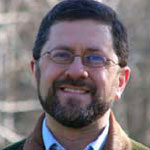 know it is truly coming from someone who has been deeply touched in his depths of his own heart by this tremendous sacrament of love. I love talking with Mike, he strengthens and encourages my own faith so much…he is such a gift to the body of Christ!  In “The Fire of God’s Love” he passes on insights on the Eucharist to inspire us all.  Saints and popes are represented in this collection, but also reflections from folks representing in our own time, like J.R.R. Tolkien,
know it is truly coming from someone who has been deeply touched in his depths of his own heart by this tremendous sacrament of love. I love talking with Mike, he strengthens and encourages my own faith so much…he is such a gift to the body of Christ!  In “The Fire of God’s Love” he passes on insights on the Eucharist to inspire us all.  Saints and popes are represented in this collection, but also reflections from folks representing in our own time, like J.R.R. Tolkien, 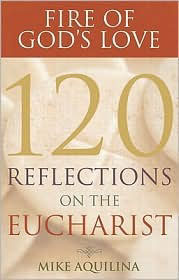 Maria Montessori, Conrad Hilton, and George Wiegel.
Maria Montessori, Conrad Hilton, and George Wiegel.
[powerpress]
Tags: catholic, catholic podcast, catholic prayer, cathollc spirituality, eucharist, eucharistic devotion, holy eucharist, Mike Aquilina More, st. anthony messenger books, st. paul center for biblical theology
This entry was posted on Sunday, June 26th, 2011 at 8:16 am
You can follow any responses to this entry through the RSS 2.0 feed.
Tags: catholic, catholic podcast, catholic prayer, cathollc spirituality, classical music, feast of corpus christi, mozart, sacred music, st thomas aquinas
This entry was posted on Sunday, June 26th, 2011 at 12:19 am
You can follow any responses to this entry through the RSS 2.0 feed.
THE PSALMS: THE BOOK OF PRAYER PAR EXCELLENCE
VATICAN CITY, 22 JUN 2011 (VIS) – Benedict XVI dedicated his catechesis during this morning’s general audience to what he described as “the book of prayer par excellence, the Book of Psalms”. The audience was held in St. Peter’s Square in the presence of 10,000 people.
The 150 Psalms of the Book of Psalms “express all human experience“, said the Pope. “All the truth of the believer comes together in those prayers, which first the People of Israel and later the Church adopted as a special way to mediate their relationship with the one God, and as an adequate response to His having revealed Himself in history“.
“Despite the many forms of expression they contain”, the Psalms “can be divided into two broad categories: … supplication associated with lamentation, and praise. These two dimensions are related, almost indivisible, because supplication is animated by the certainty that God will respond, and this opens the way to praise and thanksgiving; while praise and thanksgiving arise from the experience of salvation received, which presupposes the need for help expressed in the supplication. … Thus, in the prayer of the Psalms, supplication and praise intertwine and fuse together in a single song which celebrates the eternal grace of the Lord as He bows down to our frailty”.
“The Psalms teach us to pray”, the Holy Father explained. “In them, the Word of God becomes the word of prayer. … People who pray the Psalms speak to God with the words of God, addressing Him with the words He Himself taught us. … Through these words it is also possible to know and accept the criteria of His actions, to approach the mystery of His thoughts and His ways, so as to grow and develop in faith and love”.
“By teaching us to pray”, the Pope went on, “the Psalms also teach us that at times of desolation, even
in moments of suffering, the presence of God is a source of wonder and consolation. We may weep, plead and seek intercession, … but in the awareness that we are advancing towards the light, where praise will be unending”.
“Equally important and significant are the manner and frequency in which the words of the Psalms appear in the New Testament, where they assume and underline that prophetic significance suggested by the link of the Book of Psalms with the messianic figure of David. In His earthly life the Lord Jesus prayed with the Psalms, and in Him they reach definitive fulfilment and reveal their fullest and deepest meaning. The prayers of the Book of Psalms, with which we speak to God, speak to us of Him, they speak of the Son, image of the invisible God Who fully reveals the Father’s face to us.
Thus Christians, by praying the Psalms, pray to the Father in Christ and with Christ, seeing those songs in a new perspective which has its ultimate interpretation in the Paschal Mystery”.
Having completed his catechesis and delivered greetings in various languages, the Pope recalled the fact that tomorrow is the Feast of Corpus Christi. He invited everyone in Rome, residents and pilgrims alike, to participate in the Mass he will celebrate at 7 p.m. tomorrow in the basilica of St. John Lateran, and in the subsequent procession along Via Merulana to the basilica of St. Mary Major. “I invite you”, he said, “to join this act of profound faith towards the Eucharist, which represents the most precious treasure of the Church and of humankind”.
AG/Â Â Â Â Â Â Â Â Â Â Â Â Â Â Â Â Â Â Â Â Â Â Â Â Â Â Â VIS 20110622 (590)
For the Psalms On-Line
The more extensive translation:
ZE11062202 – 2011-06-22
Permalink: http://www.zenit.org/article-32912?l=english
ON LEARNING TO PRAY WITH THE PSALMS
Addressing Him “With the Words That He Himself Gives Us”
VATICAN CITY, JUNE 22, 2011 (Zenit.org).- Here is a translation of the Italian-language catechesis Benedict XVI gave today during the general audience held in St. Peter’s Square. The Pope continued with his series of catecheses on prayer, turning today to a consideration of the Book of Psalms.
* * *
Dear brothers and sisters,
In the preceding catecheses, we paused to consider a number of Old Testament figures who are particularly significant for our reflection on prayer. I spoke about Abraham, who intercedes for the foreign cities; about Jacob, who in his nighttime combat receives a blessing; about Moses, who begs for forgiveness for his people; and about Elijah, who prays for the conversion of Israel. With today’s catechesis, I would like to begin down a new path: Rather than commenting on particular accounts of persons at prayer, we will enter into the “prayerbook” par excellence, the Book of Psalms. In the upcoming catecheses we will read and meditate on a number of the most beautiful psalms which are also dearest to the Church’s tradition of prayer. Today I would like to introduce them by speaking about the Book of Psalms as a whole.
The Psalter presents itself as a “formulary” of prayers, a collection of 150 psalms that the biblical tradition gives to the people of believers in order that they may become their — our prayer — our way of addressing God and of relating to Him. In this book, the whole of human experience with its many facets finds expression, along with the entire range of emotions that accompany man’s existence. In the Psalms, joy and suffering, desire for God and the perception of one’s own unworthiness, delight and the sense of abandonment, trust in God and painful solitude, fullness of life and fear of death are all interwoven and expressed. The believer’s whole reality flows into these prayers, which first the people of Israel and then the Church took up as a privileged meditation on the relationship with the one God, and the fitting response to His self-revelation in history.
As prayer, the Psalms are manifestations of the soul and of faith, in which everyone can recognize himself and in which there is communicated that experience of special closeness to God, to which each man is called. And it is the whole complexity of human existence that converges in the complexity of the different literary forms of the various psalms: hymns, lamentations, individual and collective supplication, songs of thanksgiving, penitential psalms, and other genre that are found in these poetic compositions.
Despite this wide range of expression, two great areas can be identified that synthesize the prayer of the Psalter: petition, which is connected with lament, and praise — two interconnected and almost inseparable dimensions. For petition is animated by the certainty that God will respond, and this opens up to praise and thanksgiving; and praise and thanksgiving flow from the experience of salvation received, which assumes the need for the help expressed by the petition.
In petition, the one who prays laments and describes his situation of distress, of danger, of desolation; or, as in the penitential psalms, he confesses guilt and sin, and asks to be forgiven. He lays bare his neediness before the Lord, in the confidence of being heard, and this implies an acknowledgement of God as good, as desirous of the good, and as the “lover of life” (cf. Wisdom 11:26) who is ready to help, save and forgive. Thus, for example, the Psalmist in Psalm 31 prays: “In thee, O Lord, do I seek refuge; let me never be put to shame [ … ] take me out of the net which is hidden for me, for thou art my refuge (verses 2,5 [1,4]). Therefore, already in the lament something of praise may emerge, announcing itself in the hope of divine intervention, and becoming explicit once divine salvation has become a reality.
In an analogous way — in the psalms of thanksgiving and of praise — in remembering the gift received or in contemplating the greatness of God’s mercy, one recognizes one’s own littleness as well as one’s need for salvation, which is at the foundation of petition. In this way, one confesses to God one’s own condition as a creature, inevitably marked as it is by death, and yet the bearer of a radical desire for life. For this reason, in Psalm 86 the Psalmist exclaims: “I give thanks to thee, o Lord my God, with my whole heart, and I will glorify thy name forever. For great is thy steadfast love toward me; thou hast delivered my soul from the depths of Sheol” (verses 12, 13). In this way, in the prayer of the Psalms, petition and praise are interwoven and blend together into one unique song that celebrates the Lord’s eternal grace that bends down to our frailty.The book of the Psalter was given to Israel and to the Church precisely in order that the people of believers might be permitted to unite themselves to this song. The Psalms, in fact, teach us to pray. In them, the Word of God becomes the word of prayer — and they are the Psalmists’ inspired words — which also become the word of the one who prays the Psalms. This is the beauty and the special nature of this biblical book: Unlike other prayers we find in sacred Scripture, the prayers contained [in the Book of Psalms] are not inserted into a narrative story which specifies either their meaning or their function. The Psalms are given to the believer precisely as a text of prayer, which has as its one end that of becoming the prayer of the one who takes them up and, with them, addresses himself to God. Since they are the Word of God, he who prays the Psalms speaks to God with the very words that God has given to us; he addresses Him with the words that He Himself gives us. Thus, in praying the Psalms we learn to pray. They are a school of prayer.
Something analogous happens when a child begins to talk; when he learns, that is, to express his feelings, emotions, and needs with words that do not belong to him naturally, but which he learns from his parents and from those who live around him. What the child wants to express is his own personal experience, but the means of expression belong to others; and little by little he appropriates them — the words received from his parents become his words, and through those words he also learns a way of thinking and feeling; he enters into a whole world of concepts, and in this [world] he grows, relates with reality, with men and with God. At last, the language of his parents becomes his language; he speaks with the words received from others, which by now have become his words.
And so it is with the prayer of the Psalms. They are given to us so that we might learn to address ourselves to God, to communicate with Him, to talk to Him about ourselves with His words, to find language for an encounter with Him. And, through those words, it will also be possible to know and to receive the standards of his way of acting, to approach the mystery of his thoughts and of his ways (cf. Isaiah 55:8-9), so as to grow always more in faith and love. As our words are not only words, but also teach us about a real and conceptual world, so also these prayers teach us about the heart of God, for which reason are we able not only to speak with God, but also to learn who God is and — in learning how to speak with Him — we learn what is it to be man, to be ourselves.
In this regard, the title given to the Psaltery by the Jewish tradition appears significant. It is called Tehellim, an Hebraic term that means “songs of praise,” [which comes] from the root word we find in the expression “Halleluiah” — literally: “praise the Lord.” Thus, even though this prayerbook is so multifaceted and complex — with its various literary genre and with its connection between praise and petition – it is ultimately a book of praise, that teaches us to give thanks, to celebrate the greatness of the gift of God, to acknowledge the beauty of His words and to glorify His holy Name.
This is the most fitting response before God’s self-revelation, and the experience of His goodness. By teaching us to pray, the Psalms teach us that, even in the midst of desolation, in suffering, God’s presence remains and is the source of wonder and of consolation; we can cry, beg, intercede, lament, but [we do so] in the knowledge that we are walking toward the light, where praise can be definitive; “in thy light do we see light” (Psalm 36:10 [9]).
But beyond the book’s general title, the Jewish tradition has also given specific titles to many of the psalms, attributing them in great part to King David. A figure of notable human and theological depth, David is a complex personality who passed through the most varied experiences fundamental to life. A young shepherd of his father’s flock — passing through the ups and downs and at times dramatic events of life — he becomes king of Israel, the shepherd of God’s people. Although a man of peace, he fought many wars; an untiring and tenacious seeker of God, yet he betrayed His love, and this is characteristic: He always remained a seeker of God, even though he sinned gravely many times; a humble penitent, he received divine forgiveness, even divine pity, and he accepted a fate marked by suffering. Thus, in all his weakness, David was a king “after God’s own heart” (cf. 1 Samuel 13:14); that is, a passionate man of prayer, a man who knew what it meant to petition and to praise. The connection of the Psalms with this illustrious king of Israel is important, then, for he is a messianic figure, the Lord’s Anointed, in whom the mystery of Christ is in some way foreshadowed.Just as important and meaningful are the ways and frequency with which the words of the psalms are repeated in the New Testament, taking up and underscoring the prophetic value suggested by the Psalter’s connection with the messianic figure of David. In the Lord Jesus, who during His earthly life prayed with the Psalms, they find their definitive fulfillment and reveal their fullest and most profound meaning. The prayers of the Psalter, with which we speak to God, speak to us of Him, they speak to us of the Son, the image of the invisible God (Colossians 1:15), who fully reveals to us the Face of the Father. The Christian, therefore, in praying the Psalms, prays to the Father in Christ and with Christ, taking up those songs within a new perspective, which finds its ultimate interpretative key in the Paschal mystery. Thus do the horizons of the one who prays open up to unexpected realities — each Psalm acquires a new light in Christ and the Psalter is able to shine in all its infinite richness.
Dearest brothers and sisters, let us take this holy book in hand; let us allow ourselves to be taught by God to address ourselves to Him; let us make the Psalter a guide that helps us and accompanies us daily along the way of prayer. And let us, like Jesus’ disciples, also ask: “Lord, teach us to pray” (Luke 11:1), opening our hearts to receive the Teacher’s prayer, in which all prayers attain their fulfillment. Thus, made sons in the Son, will we be able to speak to God calling Him “Our Father.” Thank you.
[Translation by Diane Montagna]
Tags: catholic, catholic podcast, catholic prayer, cathollc spirituality, pope benedict xvi, prayer, psalms
This entry was posted on Wednesday, June 22nd, 2011 at 9:23 am
You can follow any responses to this entry through the RSS 2.0 feed.
T
THE POWER OF INTERCESSION: THE PROPHET ELIJAH’S PRAYER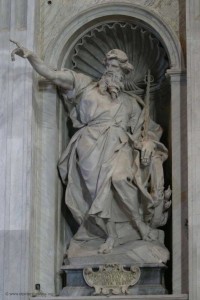
VATICAN CITY, 15 JUN 2011 (VIS) – In his general audience, held this morning in St. Peter’s Square, the Pope resumed his series of catecheses dedicated to the subject of prayer, focusing today on the Prophet Elijah “whom God sent to bring the people to conversion”.
The Holy Father explained how “upon Mount Carmel Elijah revealed himself in all his power as intercessor when, before the whole of Israel, he prayed to the Lord to show Himself and convert people’s hearts. The episode is recounted in chapter 18 of the First Book of Kings”.
“The contest between Elijah and the followers of Baal (which was, in fact, a contest between the Lord of Israel, God of salvation and life, and a mute and ineffective idol which can do nothing for either good or evil) also marked the beginning of a confrontation between two completely different ways to address God and to pray”. The oblations of the prophets of Baal “revealed only the illusory reality of the idol … which closed people in the confines of a desperate search for self”.
On the other hand, Elijah “called on the people to come closer, involving them in his actions and his prayer. … The prophet built an alter using ‘twelve stones, according to the number of the tribes of the sons of Jacob’, … to represent all Israel. … Elijah then addressed the Lord calling Him Lord of the fathers, thus implicitly recalling the divine promises and the history of choice and alliance which had indissolubly united the Lord to His people”.
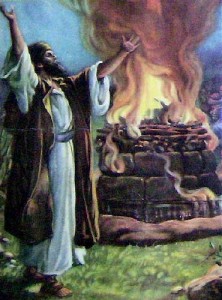 The prophet’s request “was that the people might finally and fully come to know and understand Who their God is, and make the decisive decision to follow only Him. Only in this way could God be recognised as Absolute and Transcendent”. Only in this way would it be clear that “no other gods could be placed at His side, as this would deny His absoluteness and relativize Him”.
The prophet’s request “was that the people might finally and fully come to know and understand Who their God is, and make the decisive decision to follow only Him. Only in this way could God be recognised as Absolute and Transcendent”. Only in this way would it be clear that “no other gods could be placed at His side, as this would deny His absoluteness and relativize Him”.
Benedict XVI highlighted how
“believers must respond to the absoluteness of God with absolute and total love, a love involving all their lives, their energies, their hearts. … In his intercession, Elijah asked of God what God Himself wished to do: to show Himself in all His mercy, faithful to His nature as Lord of life Who forgives, converts and transforms”.
“The Lord responded unequivocally, not only burning the offering but even consuming all the water that had been poured around the altar. Israel could no longer doubt: divine mercy had responded to its weakness, to its doubts, to its lack of faith. Now Baal, the vain idol, was beaten and the people, who seemed lost, had rediscovered the way of truth, they had rediscovered themselves“.
The Holy Father concluded by asking himself what this story has to tell us today.
“Firstly”, he said, “is the priority of the first commandment of God’s Law: having no god but God. When God disappears man falls into slavery, into idolatry, as has happened in our time under totalitarian regimes and with the various forms of nihilism which make man dependent on idols and idolatry, which enslave”. Secondly, he continued, “the main objective of prayer is conversion: the fire of God which transforms our hearts and makes us capable of seeing God and living for Him and for others”. Thirdly, “the Church Fathers tell us that this story is … a foretaste of the future, which is Christ. It is a step on the journey towards Christ”.
AG/ VIS 20110615 (590)
Published by VIS – Holy See Press Office – Wednesday, June 15, 2011
Tags: catholic, catholic podcast, catholic prayer, cathollc spirituality, elijah, intercession, pope benedict xvi, prayer
This entry was posted on Wednesday, June 15th, 2011 at 9:10 am
You can follow any responses to this entry through the RSS 2.0 feed.
[powerpress = “vatican-radio”]
EVANGELISATION IS A TASK FOR ALL MEMBERS OF THE CHURCH
VATICAN CITY, 14 JUN 2011 (VIS) – Yesterday at 7.30 p.m. in the Roman basilica of St. John Lateran Benedict XVI inaugurated an ecclesial congress marking the close of the pastoral year of the diocese of Rome. The congress, which will run from 13 to 15 June, has as its theme: “The joy of engendering the faith in the Church of Rome”.
Commenting on the choice of theme, the Pope affirmed that “the faith cannot endure by itself in the world, it is not automatically transmitted to men’s hearts but always has to be announced. And the announcement of the faith, in order to be effective, must come from a heart that believes, that hopes, that loves, a heart that adores Christ and believes in the power of the Holy Spirit. … The response of faith arises when, by God’s grace, man discovers that believing means finding true life, the ‘full life'”.
The Holy Father highlighted the fact that
“the Church, each one of us, must bring the world the good news that Jesus is Lord, the One in Whom God’s closeness and love for each man and woman became flesh. This announcement must resound anew in regions of ancient Christian tradition”. In this context the Pope recalled words he had pronounced at World Youth Day 2005 in Cologne, Germany: “The happiness you seek, the happiness you have the right to enjoy, has a name and a face: Jesus of Nazareth, concealed in the Eucharist.
“If mankind forgets God”, he added, “this is also because Jesus is often reduced to the status of a wise man, and His divinity is diminished if not denied outright. This way of thinking makes it impossible to comprehend the radical novelty of Christianity, because if Jesus is not the only Son of the Father, then God did not enter into the history of mankind. The truth is that the incarnation is at the very heart of the Gospel. May we, then, show increasing commitment to renewing evangelisation, which is a task not just for the few but for all the members of the Church“.
“Should we too not share the beauty and reason of the faith, and carry the light of God to the men and women of our time with courage, conviction and joy?” Pope Benedict asked. “Many are the people who have not yet met the Lord; they must be given our special pastoral attention. … Today this is more urgent than ever and requires us to commit ourselves trustingly, upheld by the certainty that the grace of God always works on the heart of man”.
Tags: catholic, catholic podcast, catholic prayer, cathollc spirituality, discerning heart, new evangelization, pope benedict xvi, vatican radio
This entry was posted on Wednesday, June 15th, 2011 at 5:10 am
You can follow any responses to this entry through the RSS 2.0 feed.
[powerpress feed = “devotionals-prayers”]
JUNE 2011
General Intention: That priests, united to the Heart of Christ, may always be true witnesses of the caring and merciful love of God.
Missionary Intention: That the Holy Spirit may bring forth from our communities numerous missionary vocations, willing to fully consecrate themselves to spreading the Kingdom of God.
Tags: catholic, catholic podcast, catholic prayer, cathollc spirituality, pope benedict xvi, prayer
This entry was posted on Wednesday, June 1st, 2011 at 12:03 am
You can follow any responses to this entry through the RSS 2.0 feed.
For Complete Updated Text in English click here
VATICAN CITY, 25 MAY 2011 (VIS) – Continuing with his catecheses on prayer, Benedict XVI spoke in today’s general audience about the Patriarch Jacob and his fight with the unknown man at the ford of the Jabbok. The audience was held in St. Peter’s Square with 15,000 people in attendance.
The Bible, explained the Pope, describes Jacob as an astute man who obtains things through deception. At a certain point, he sets out to return to his homeland and face his brother, whose firstborn birthrights he had taken. Jacob waits overnight in order to cross the ford safely but something unforeseen occurs: he is suddenly attacked by an unknown man with whom he struggles the entire night. The story details their struggle, which has no clear winner, leaving the rival a mystery. “Only at the end, when the struggle is finished and that ‘someone’ has disappeared, only then will Jacob name him and be able to say that he had struggled with God”.
Once the fight is over Jacob says to his opponent that he will only let him go if he blesses him. Jacob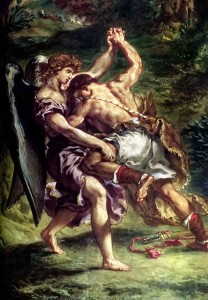 “who had defrauded his brother out of the first-born’s blessing through deceit, now demands [a blessing] from the unknown man, in whom he perhaps begins to see divine traits, but still without being able to truly recognize him. His rival, who seems restrained and therefore defeated by Jacob, instead of bowing to the Patriarch’s request, asks his name. … In the Biblical mentality, knowing someone’s name entails a type of power because it contains the person’s deepest reality, revealing their secret and their destiny. … This is why, when Jacob reveals his name, he is putting himself in his opponent’s hands. It is a form of surrender, a complete giving over of himself to the other”.
“who had defrauded his brother out of the first-born’s blessing through deceit, now demands [a blessing] from the unknown man, in whom he perhaps begins to see divine traits, but still without being able to truly recognize him. His rival, who seems restrained and therefore defeated by Jacob, instead of bowing to the Patriarch’s request, asks his name. … In the Biblical mentality, knowing someone’s name entails a type of power because it contains the person’s deepest reality, revealing their secret and their destiny. … This is why, when Jacob reveals his name, he is putting himself in his opponent’s hands. It is a form of surrender, a complete giving over of himself to the other”.
Paradoxically, however, “in this gesture of surrender, Jacob also becomes the victor because he receives a new name, together with the recognition of his victory on the part of his adversary”. The name “Jacob”, Benedict XVI continued, “recalls the verb ‘to deceive’ or ‘to supplant’. After the struggle, in a gesture of deliverance and surrender, the Patriarch reveals his reality as a deceiver, a usurper, to his opponent. The other, who is God, however, transforms this negative reality into a positive one. Jacob the deceiver becomes Israel. He is given a new name as a sign of his new identity … the mostly likely meaning of which is ‘God is strong, God wins’. When, in turn, Jacob asks his rival’s name, he refuses to say it but reveals himself in an unmistakable 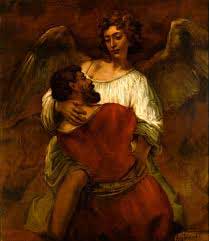 gesture, giving his blessing. … This is not a blessing obtained through deceit but one given freely by God, which Jacob can now receive because, without cunning or deception, he gives himself over unarmed, accepts surrender and admits the truth about himself”.
gesture, giving his blessing. … This is not a blessing obtained through deceit but one given freely by God, which Jacob can now receive because, without cunning or deception, he gives himself over unarmed, accepts surrender and admits the truth about himself”.
In the episode of the fight at the ford of Jabbok, the Pope observed, “the people of Israel speak of their origin and outline the features of a unique relationship between God and humanity. This is why, as also affirmed in the Catechism of the Catholic Church, ‘from this account, the spiritual tradition of the Church has retained the symbol of prayer as a battle of faith and as the triumph of perseverance'”.
“Our entire lives”, concluded the Holy Father, “are like this long night of struggle and prayer, passed in the desire of and request for God’s blessing, which cannot be ripped away or won over through our strength, but must be received with humility from Him as a gratuitous gift that allows us, finally, to recognize the face of the Lord. And when this happens, our entire reality changes: we receive a new name and God’s blessing”.
AG/Â Â Â Â Â Â Â Â Â Â Â Â Â Â Â Â Â Â Â Â Â Â Â Â Â Â Â VIS 20110525 (620)
updated…the complete text in English from Vatican.va:
top
BENEDICT XVI
GENERAL AUDIENCE
St. Peter’s Square
Wednesday, 25 May 2011
[Video]
Dear Brothers and Sisters,
Today I would like to reflect with you on a text from the Book of Genesis which recounts a rather curious incident in the narrative of the Patriarch Jacob. It is a passage that is not easy to interpret, but it is important for our life of faith and prayer; we are talking about the story of his struggle with God at the ford of the Jabbok, a portion of which we just heard.
As you will recall, Jacob had deprived his twin brother Esau of his birthright in exchange for a dish of lentils and then, by trickery, managed to receive the blessing from his father Isaac, now very elderly, taking advantage of the latter’s blindness. Having fled from Esau’s wrath, he took refuge with one of his relatives, Laban; he married, acquired some wealth, and was returning to his homeland, ready to face his brother having first put into place some prudent provisions. However, when everything was ready for this meeting, after having had those who were with him cross the ford of the stream that marked the boundary of Esau’s territory, Jacob, who had remained behind alone, was suddenly set upon by an unknown man with whom he wrestled the whole night. This hand-to-hand combat, which we find described in chapter 32 of the Book of Genesis, became for him a singular experience of God.
Night is the favourable time for acting secretly, the best time, therefore, for Jacob to enter his brother’s territory unseen, perhaps thinking to take Esau by surprise. It is he, however, who is surprised by an unforeseen attack, one for which he was unprepared. Having used his cleverness to try to escape a dangerous situation, he thought he had managed to have everything under control; instead he now finds himself forced to enter a mysterious struggle that catches him alone and gives him no opportunity to organize a proper defence. Unarmed, in the night, the Patriarch Jacob wrestles with someone. The text does not specify the identity of the aggressor; it uses a Hebrew word that indicates “a man†in a generic sense, “one, someoneâ€; it is, therefore, a vague, indeterminate definition that purposely keeps the assailant shrouded in mystery. It is dark, Jacob does not manage to see his opponent clearly, and even for the reader, for us, he remains anonymous; someone is opposing the Patriarch, and this is the only certain data supplied by the narrator. Only at the end, when the wrestling is over and that “someone†will have disappeared, only then will Jacob name him and be able to say that he had wrestled with God.
The episode, therefore, takes place in darkness and it is difficult to ascertain not only the identity of Jacob’s assailant, but also how the struggle is going. On reading the passage, it is rather difficult to determine which of the two contenders is gaining the upper hand; the verbs used often lack a specific subject, and the actions take place almost in a contradictory manner, so that when it looks as though one of the two is winning, the next action immediately denies that and shows the other to be the victor. At the beginning, in fact, Jacob seems to be the stronger and of his opponent, the text says, “he did not prevail over him†(v. 25); yet he strikes Jacob’s hip at its socket, dislocating it. Thus one thinks that Jacob would have to give in, but instead it is his opponent who asks him to release him; and the Patriarch refuses, setting one condition: “I will not let you go, unless you bless me†(v. 27). The one who tricked his brother and robbed him of the blessing of the firstborn now claims it from the stranger, thus perhaps beginning to perceive some kind of divine meaning, but without yet being able to recognize it for certain.
His rival, who seems to be held back and therefore defeated by Jacob, rather than giving in to the Patriarch’s request, asks him his name: “What is your name?â€. And the Patriarch replies: “Jacob†(v. 28). Here the struggle takes an important turn. In fact, knowing someone’s name implies a kind of power over that person because in the biblical mentality the name contains the most profound reality of the individual, it reveals the person’s secret and destiny. Knowing one’s name therefore means knowing the truth about the other person and this allows one to dominate him. When, therefore, in answer to the unknown person’s request Jacob discloses his own name, he is placing himself in the hands of his opponent; it is a form of surrender, a total handing over of self to the other.
However, in this act of surrender paradoxically Jacob too emerges victorious because he receives a new name with the recognition of his victory by his adversary, who says to him: “You shall no longer be spoken of as Jacob, but as Israel, because you have contended with divine and human beings and have prevailed†(v. 29). “Jacob†was a name that recalled the Patriarch’s problematic beginnings; in Hebrew, in fact, it recalls the term “heel†and takes the reader back to the time of Jacob’s birth when, as he left his mother’s womb, he held onto the heel of his twin brother (cf. Gen 25:26), almost prefiguring the unfair advantage he would take over his brother in adulthood; however the name Jacob also recalls the verb “to deceive, to supplantâ€. Well, now, in the struggle in this act of surrender and submission, the Patriarch reveals his true identity as a deceiver, the one who supplants; however the other, who is God, transforms this negative reality into something positive: Jacob the deceiver becomes Israel, he is given a new name as a sign of a new identity. Here, too, the account maintains its deliberate duplicity because the more probable meaning of the name Israel is “God is strong, God is victoriousâ€.
Therefore Jacob has prevailed, he won — his adversary himself says so — but his new identity, which he has received from the adversary himself, affirms and bears witness to God’s victory. And when Jacob in turn asks his opponent his name, the latter refuses to say it, but reveals himself in an unequivocal gesture, giving him the blessing. The blessing that the Patriarch had requested at the beginning of the struggle is now granted him. However, it is not a blessing obtained through deceit, but one given freely by God, which Jacob can receive because he is now alone, without protection, without cunning or tricks; he gives himself over unarmed, agrees to surrender and confesses the truth about himself. Therefore, at the end of the struggle, having received the blessing, the Patriarch can finally recognize the other, the God of blessings: Truly, he says, “I have seen God face to face, and yet my life is preserved†(v. 30), and now he can cross the ford, the bearer of a new name but “conquered†by God and marked forever, limping because of the injury he received (v. 31).
Biblical exegetes give many interpretations to this passage; the scholars in particular recognize in it literary connotations and components of various genres, as well as references to some popular accounts. But when these elements are taken up by the authors of the Sacred texts and incorporated into the biblical narrative, they change their meaning and the text opens up to broader dimensions. For the believer the episode of the struggle at the Jabbok thus becomes a paradigm in which the people of Israel speak of their own origins and outline the features of a particular relationship between God and humanity. Therefore, as is also affirmed in the Catechism of the Catholic Church, “from this account, the spiritual tradition of the Church has retained the symbol of prayer as a battle of faith and as the triumph of perseverance†(n. 2573). The Bible text speaks to us about a long night of seeking God, of the struggle to learn his name and see his face; it is the night of prayer that, with tenacity and perseverance, asks God for a blessing and a new name, a new reality that is the fruit of conversion and forgiveness.
For the believer Jacob’s night at the ford of the Jabbok thus becomes a reference point for understanding the relationship with God that finds in prayer its greatest expression. Prayer requires trust, nearness, almost a hand-to-hand contact that is symbolic not of a God who is an enemy, an adversary, but a Lord of blessing who always remains mysterious, who seems beyond reach. Therefore the author of the Sacred text uses the symbol of the struggle, which implies a strength of spirit, perseverance, tenacity in obtaining what is desired. And if the object of one’s desire is a relationship with God, his blessing and love, then the struggle cannot fail but ends in that self-giving to God, in recognition of one’s own weakness, which is overcome only by giving oneself over into God’s merciful hands.
Dear brothers and sisters, our entire lives are like this long night of struggle and prayer, spent in desiring and asking for God’s blessing, which cannot be grabbed or won through our own strength but must be received with humility from him as a gratuitous gift that ultimately allows us to recognize the Lord’s face. And when this happens, our entire reality changes; we receive a new name and God’s blessing. And, what is more: Jacob, who receives a new name, and becomes Israel, also gives a new name to the place where he wrestled with God, where he prayed; he renames it Penuel, which means: “The Face of Godâ€. With this name he recognizes that this place is filled with the Lord’s presence, making that land sacred and thus leaving a memorial of that mysterious encounter with God. Whoever allows himself to be blessed by God, who abandons himself to God, who permits himself to be transformed by God, renders a blessing to the world. May the Lord help us to fight the good fight of the faith (cf. 1 Tim 6:12; 2 Tim 4:7) and to ask, in prayer, for his blessing, that he may renew us in the expectation of beholding his Face. Thank you.
top
Tags: catholic, catholic podcast, catholic prayer, cathollc spirituality, Patriarch Jacob, pope benedict xvi, the Patriarch
This entry was posted on Thursday, May 26th, 2011 at 8:22 am
You can follow any responses to this entry through the RSS 2.0 feed.
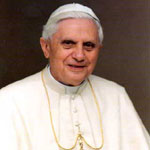 From Vatican.va (the extended version translated into English from the Italian)
From Vatican.va (the extended version translated into English from the Italian)
GENERAL AUDIENCE
(the fuller catechesis translated into English from the Italian text)
Dear brothers and sisters,
In the two previous catechesis we thought that prayer is a universal phenomenon, which – although in different forms – is present in the cultures of all time.
Today instead I would like to start out on a biblical path on this topic which will guide us to deepening the dialogue of the Covenant between God and man, which enlivened the history of salvation to its culmination, to the definitive Word that is Jesus Christ.
This path will lead us to reflect on certain important texts and paradigmatic figures of the Old and New Testaments. It will be Abraham the great Patriarch, the father of all believers (cf. Rom 4:11-12, 16-17), to offer us a first example of prayer in the episode of intercession for the cities of Sodom and Gomorrah.
And I would also like to ask you to benefit from the journey we shall be making in the forthcoming catecheses to become more familiar with the Bible, which I hope you have in your homes and, during the week, to pause to read it and to meditate upon it in prayer, in order to know the marvellous history of the relationship between God and man, between God who communicates with us and man who responds, who prays.
The first text on which we shall reflect is in chapter 18 of the Book of Genesis. It is recounted that the evil of the inhabitants of Sodom and Gomorrah had reached the height of depravity so as to require an intervention of God, an act of justice, that would prevent the evil from destroying those cities.
It is here that Abraham comes in, with his prayer of intercession. God decides to reveal to him what is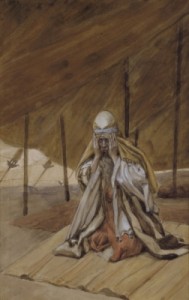 about to happen and acquaints him with the gravity of the evil and its terrible consequences, because Abraham is his chosen one, chosen to become a great people and to bring the divine blessing to the whole world. His is a mission of salvation which must counter the sin that has invaded human reality; the Lord wishes to bring humanity back to faith, obedience and justice through Abraham. And now this friend of God seeing the reality and neediness of the world, prays for those who are about to be punished and begs that they be saved.
about to happen and acquaints him with the gravity of the evil and its terrible consequences, because Abraham is his chosen one, chosen to become a great people and to bring the divine blessing to the whole world. His is a mission of salvation which must counter the sin that has invaded human reality; the Lord wishes to bring humanity back to faith, obedience and justice through Abraham. And now this friend of God seeing the reality and neediness of the world, prays for those who are about to be punished and begs that they be saved.
Abraham immediately postulates the problem in all its gravity and says to the Lord: “Will you indeed destroy the righteous with the wicked? Suppose there are fifty righteous within the city; will you then destroy the place and not spare it for the fifty righteous who are in it? Far be it from you to do such a thing, to slay the righteous with the wicked, so that the righteous fare as the wicked! Far be that from you! Shall not the Judge of all the earth do right?†(Gen 18: 23-25).
Speaking these words with great courage, Abraham confronts God with the need to avoid a perfunctory form of justice: if the city is guilty it is right to condemn its crime and to inflict punishment, but — the great Patriarch affirms — it would be unjust to punish all the inhabitants indiscriminately. If there are innocent people in the city, they must not be treated as the guilty. God, who is a just judge, cannot act in this way, Abraham says rightly to God.
However, if we read the text more attentively we realize that Abraham’s request is even more pressing and more profound because he does not stop at asking for salvation for the innocent. Abraham asks forgiveness for the whole city and does so by appealing to God’s justice; indeed, he says to the Lord: “Will you then destroy the place and not spare it for the fifty righteous who are in it?†(v. 24b).
In this way he brings a new idea of justice into play: not the one that is limited to punishing the guilty, as men do, but a different, divine justice that seeks goodness and creates it through forgiveness that transforms the sinner, converts and saves him. With his prayer, therefore, Abraham does not invoke a merely compensatory form of justice but rather an intervention of salvation which, taking into account the innocent, also frees the wicked from guilt by forgiving them.
Abraham’s thought, which seems almost paradoxical, could be summed up like this: obviously it is not possible to treat the innocent as guilty, this would be unjust; it would be necessary instead to treat the guilty as innocent, putting into practice a “superior†form of justice, offering them a possibility of salvation because, if evildoers accept God’s pardon and confess their sin, letting themselves be saved, they will no longer continue to do wicked deeds, they too will become righteous and will no longer deserve punishment.
It is this request for justice that Abraham expresses in his intercession, a request based on the certainty that the Lord is merciful. Abraham does not ask God for something contrary to his essence, he knocks at the door of God’s heart knowing what he truly desires.
Sodom, of course, is a large city, 50 upright people seem few, but are not the justice and forgiveness of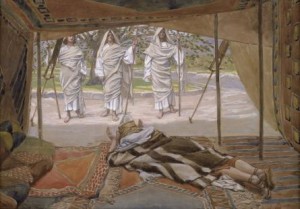 God perhaps proof of the power of goodness, even if it seems smaller and weaker than evil? The destruction of Sodom must halt the evil present in the city, but Abraham knows that God has other ways and means to stem the spread of evil. It is forgiveness that interrupts the spiral of sin and Abraham, in his dialogue with God, appeals for exactly this. And when the Lord agrees to forgive the city if 50 upright people may be found in it, his prayer of intercession begins to reach the abysses of divine mercy.
God perhaps proof of the power of goodness, even if it seems smaller and weaker than evil? The destruction of Sodom must halt the evil present in the city, but Abraham knows that God has other ways and means to stem the spread of evil. It is forgiveness that interrupts the spiral of sin and Abraham, in his dialogue with God, appeals for exactly this. And when the Lord agrees to forgive the city if 50 upright people may be found in it, his prayer of intercession begins to reach the abysses of divine mercy.
Abraham — as we remember — gradually decreases the number of innocent people necessary for salvation: if 50 would not be enough, 45 might suffice, and so on down to 10, continuing his entreaty, which became almost bold in its insistence: “suppose 40… 30… 20… are found there†(cf. vv. 29, 30, 31, 32). The smaller the number becomes, the greater God’s mercy is shown to be. He patiently listens to the prayer, he hears it and repeats at each supplication: “I will spare… I will not destroy… I will not do it†(cf. vv. 26,28, 29, 30, 31, 32).
Thus, through Abraham’s intercession, Sodom can be saved if there are even only 10 innocent people in it.
This is the power of prayer. For through intercession, the prayer to God for the salvation of others, the desire for salvation which God nourishes for sinful man is demonstrated and expressed. Evil, in fact, cannot be accepted, it must be identified and destroyed through punishment: The destruction of Sodom had exactly this function.
Yet the Lord does not want the wicked to die, but rather that they convert and live (cf. Ez 18:23; 33:11); his desire is always to forgive, to save, to give life, to transform evil into good. Well, it is this divine desire itself which becomes in prayer the desire of the human being and is expressed through the words of intercession.
With his entreaty, Abraham is lending his voice and also his heart, to the divine will. God’s desire is for mercy and love as well as his wish to save; and this desire of God found in Abraham and in his prayer the possibility of being revealed concretely in human history, in order to be present wherever there is a need for grace. By voicing this prayer, Abraham was giving a voice to what God wanted, which was not to destroy Sodom but to save it, to give life to the converted sinner.
This is what the Lord desires and his dialogue with Abraham is a prolonged and unequivocal demonstration of his merciful love. The need to find enough righteous people in the city decreases and in the end 10 were to be enough to save the entire population.
The reason why Abraham stops at 10 is not given in the text. Perhaps it is a figure that indicates a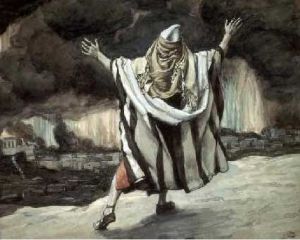 minimum community nucleus (still today, 10 people are the necessary quorum for public Jewish prayer). However, this is a small number, a tiny particle of goodness with which to start in order to save the rest from a great evil.
minimum community nucleus (still today, 10 people are the necessary quorum for public Jewish prayer). However, this is a small number, a tiny particle of goodness with which to start in order to save the rest from a great evil.
However, not even 10 just people were to be found in Sodom and Gomorrah so the cities were destroyed; a destruction paradoxically deemed necessary by the prayer of Abraham’s intercession itself. Because that very prayer revealed the saving will of God: the Lord was prepared to forgive, he wanted to forgive but the cities were locked into a totalizing and paralyzing evil, without even a few innocents from whom to start in order to turn evil into good.
This the very path to salvation that Abraham too was asking for: being saved does not mean merely escaping punishment but being delivered from the evil that dwells within us. It is not punishment that must be eliminated but sin, the rejection of God and of love which already bears the punishment in itself.
The Prophet Jeremiah was to say to the rebellious people: “Your wickedness will chasten you, and your apostasy will reprove you. Know and see that it is evil and bitter for you to forsake the Lord your God†(Jer 2:19).
It is from this sorrow and bitterness that the Lord wishes to save man, liberating him from sin. Therefore, however, a transformation from within is necessary, some foothold of of goodness, a beginning from which to start out in order to change evil into good, hatred into love, revenge into forgiveness.
For this reason there must be righteous people in the city and Abraham continuously repeats: “suppose there are…â€. “Thereâ€: it is within the sick reality that there must be that seed of goodness which can heal and restore life. It is a word that is also addressed to us: so that in our cities the seed of goodness may be found; that we may do our utmost to ensure that there are not only 10 upright people, to make our cities truly live and survive and to save ourselves from the inner bitterness which is the absence of God. And in the unhealthy situation of Sodom and Gomorrah that seed of goodness was not to be found.
Yet God’s mercy in the history of his people extends further. If in order to save Sodom 10 righteous people were necessary, the Prophet Jeremiah was to say, on behalf of the Almighty, that only one upright person was necessary to save Jerusalem: “Run to and fro through the streets of Jerusalem, look and take note! Search her squares to see if you can find a man, one who does justice and seeks truth; that I may pardon her†(5:1).
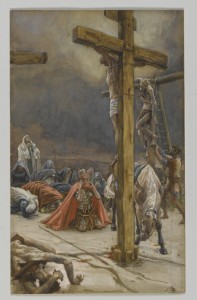 The number dwindled further, God’s goodness proved even greater. Nonetheless this did not yet suffice, the superabundant mercy of God did not find the response of goodness that he sought, and under the  siege of the enemy Jerusalem fell.
The number dwindled further, God’s goodness proved even greater. Nonetheless this did not yet suffice, the superabundant mercy of God did not find the response of goodness that he sought, and under the  siege of the enemy Jerusalem fell.
It was to be necessary for God himself to become that one righteous person. And this is the mystery of the Incarnation: to guarantee a just person he himself becomes man. There will always be one righteous person because it is he. However, God himself must become that just man. The infinite and surprising divine love was to be fully manifest when the Son of God was to become man, the definitive Righteous One, the perfect Innocent who would bring salvation to the whole world by dying on the Cross, forgiving and interceding for those who “know not what they do†(Lk 23:34). Therefore the prayer of each one will find its answer, therefore our every intercession will be fully heard.
Dear brothers and sisters, the prayer of intercession of Abraham, our father in the faith, teaches us to open our hearts ever wider to God’s superabundant mercy so that in daily prayer we may know how to desire the salvation of humanity and ask for it with perseverance and with trust in the Lord who is great in love. Many thanks.
Tags: Abraham, catholic, catholic podcast, catholic prayer, cathollc spirituality, pope benedict xvi, prayer
This entry was posted on Monday, May 23rd, 2011 at 5:37 pm
You can follow any responses to this entry through the RSS 2.0 feed.
From Vatican.va (the extended version translated into English from the Italian)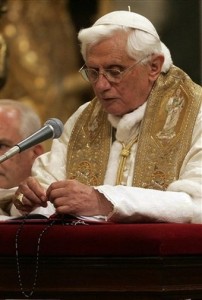
GENERAL AUDIENCE
(the fuller catechesis translated into English from the Italian text)
Piazza San Pietro
Wednesday, May 11, 2011
Dear brothers and sisters,
Today I wish to continue my reflection on how prayer and the sense of religion have been part of man throughout his history.
We live in an age in which the signs of secularism are glaringly obvious. God seems to have disappeared from the horizon of some people or to have become a reality that meets with indifference. Yet at the same time we see many signs of a reawakening of the religious sense, a rediscovery of the importance of God to the human being’s life, a need for spirituality, for going beyond a purely horizontal and materialistic vision of human life.
A look at recent history reveals the failure of the predictions of those who, in the age of the Enlightenment, foretold the disappearance of religions and who exalted absolute reason, detached from faith, a reason that was to dispel the shadows of religious dogmatism and was to dissolve the “world of the sacredâ€, restoring to the human being freedom, dignity and autonomy from God. The experience of the past century, with the tragedy of the two World Wars, disrupted the progress that autonomous reason, man without God, seemed to have been able to guarantee.
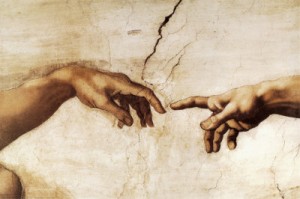 The Catechism of the Catholic Church says: “In the act of creation, God calls every being from nothingness into existence…. Even after losing through his sin his likeness to God, man remains an image of his Creator, and retains the desire for the one who calls him into existence. All religions bear witness to man’s essential search for God†(n. 2566). We could say — as I explained in my last Catecheses — that there has been no great civilization, from the most distant epoch to our day, which has not been religious.
The Catechism of the Catholic Church says: “In the act of creation, God calls every being from nothingness into existence…. Even after losing through his sin his likeness to God, man remains an image of his Creator, and retains the desire for the one who calls him into existence. All religions bear witness to man’s essential search for God†(n. 2566). We could say — as I explained in my last Catecheses — that there has been no great civilization, from the most distant epoch to our day, which has not been religious.
Man is religious by nature, he is homo religiosus just as he is homo sapiens and homo faber: “The desire for God†the Catechism says further, “is written in the human heart, because man is created by God and for God†(n. 27). The image of the Creator is impressed on his being and he feels the need to find light to give a response to the questions that concern the deep sense of reality; a response that he cannot find in himself, in progress, in empirical science.
The homo religiosus does not only appear in the sphere of antiquity, he passes through the whole of human history. In this regard, the rich terrain of human experience has seen the religious sense develop in various forms, in the attempt to respond to the desire for fullness and happiness. The “digital†man, like the cave man, seeks in the religious experience ways to overcome his finiteness and to guarantee his precarious adventure on earth. Moreover, life without a transcendent horizon would not have its full meaning and happiness, for which we all seek, is spontaneously projected towards the future in a tomorrow that has yet to come.
 In the Declaration Nostra Aetate the Second Vatican Council stressed in summary form: “Men look to their different religions for an answer to the unsolved riddles of human existence. The problems that weigh heavily on the hearts of men are the same today as in the ages past. What is man? — [who am I?] — What is the meaning and purpose of life? What is upright behaviour, and what is sinful? Where does suffering originate, and what end does it serve? How can genuine happiness be found? What happens at death? What is judgement? What reward follows death? And finally, what is the ultimate mystery, beyond human explanation, which embraces our entire existence, from which we take our origin and towards which we tend?†(n. 1).
In the Declaration Nostra Aetate the Second Vatican Council stressed in summary form: “Men look to their different religions for an answer to the unsolved riddles of human existence. The problems that weigh heavily on the hearts of men are the same today as in the ages past. What is man? — [who am I?] — What is the meaning and purpose of life? What is upright behaviour, and what is sinful? Where does suffering originate, and what end does it serve? How can genuine happiness be found? What happens at death? What is judgement? What reward follows death? And finally, what is the ultimate mystery, beyond human explanation, which embraces our entire existence, from which we take our origin and towards which we tend?†(n. 1).
Man knows that, by himself, he cannot respond to his own fundamental need to understand. However much he is deluded and still deludes himself that he is self-sufficient, he experiences his own insufficiency. He needs to open himself to something more, to something or to someone that can give him what he lacks, he must come out of himself towards the One who is able to fill the breadth and depth of his desire.
Man bears within him a thirst for the infinite, a longing for eternity, a quest for beauty, a desire for love, a need for light and for truth which impel him towards the Absolute; man bears within him the desire for God. And man knows, in a certain way, that he can turn to God, he knows he can pray to him.
St Thomas Aquinas, one of the greatest theologians of history, defines prayer as “an expression of man’s desire for Godâ€. This attraction to God, which God himself has placed in man, is the soul of prayer, that then takes on a great many forms, in accordance with the history, the time, the moment, the grace and even the sin of every person praying. Man’s history has in fact known various forms of prayer, because he has developed different kinds of openness to the “Other†and to the Beyond, so that we may recognize prayer as an experience present in every religion and culture.
 Indeed, dear brothers and sisters, as we saw last Wednesday, prayer is not linked to a specific context, but is written on the heart of every person and of every civilization. Of course, when we speak of prayer as an experience of the human being as such, of the homo orans, it is necessary to bear in mind that it is an inner attitude before being a series of practices and formulas, a manner of being in God’s presence before performing acts of worship or speaking words.
Indeed, dear brothers and sisters, as we saw last Wednesday, prayer is not linked to a specific context, but is written on the heart of every person and of every civilization. Of course, when we speak of prayer as an experience of the human being as such, of the homo orans, it is necessary to bear in mind that it is an inner attitude before being a series of practices and formulas, a manner of being in God’s presence before performing acts of worship or speaking words.
Prayer is centred and rooted in the inmost depths of the person; it is therefore not easily decipherable and, for the same reason, can be subject to misunderstanding and mystification. In this sense too we can understand the expression: prayer is difficult. In fact, prayer is the place par excellence of free giving, of striving for the Invisible, the Unexpected and the Ineffable. Therefore, the experience of prayer is a challenge to everyone, a “grace†to invoke, a gift of the One to whom we turn.
In prayer, in every period of history, man considers himself and his situation before God, from God and in relation to God, and experiences being a creature in need of help, incapable of obtaining on his own the fulfilment of his life and his hope. The philosopher Ludwig Wittgenstein mentioned that “prayer means feeling that the world’s meaning is outside the worldâ€.
 In the dynamic of this relationship with the one who gives meaning to existence, with God, prayer has one of its typical expressions in the gesture of kneeling. It is a gesture that has in itself a radical ambivalence. In fact, I can be forced to kneel — a condition of indigence and slavery — but I can also kneel spontaneously, declaring my limitations and therefore my being in need of Another. To him I declare I am weak, needy, “a sinnerâ€.
In the dynamic of this relationship with the one who gives meaning to existence, with God, prayer has one of its typical expressions in the gesture of kneeling. It is a gesture that has in itself a radical ambivalence. In fact, I can be forced to kneel — a condition of indigence and slavery — but I can also kneel spontaneously, declaring my limitations and therefore my being in need of Another. To him I declare I am weak, needy, “a sinnerâ€.
In the experience of prayer, the human creature expresses all his self-awareness, all that he succeeds in grasping of his own existence and, at the same time, he turns with his whole being to the One before whom he stands, directs his soul to that Mystery from which he expects the fulfilment of his deepest desires and help to overcome the neediness of his own life. In this turning to “Anotherâ€, in directing himself “beyond†lies the essence of prayer, as an experience of a reality that overcomes the tangible and the contingent.
Yet only in God who reveals himself does man’s seeking find complete fulfilment. The prayer that is openness and elevation of the heart to God, thus becomes a personal relationship with him. And even if man forgets his Creator, the living, true God does not cease to call man first to the mysterious encounter of prayer
As the Catechism says: “in prayer, the faithful God’s initiative of love always comes first; our own first step is always a response. As God gradually reveals himself and reveals man to himself, prayer appears as a reciprocal call, a covenant drama. Through words and actions, this drama engages the heart. It unfolds throughout the whole history of salvation†(n. 2567).
Dear brothers and sisters, we learn to stay more in front of God, God who has revealed himself in Jesus Christ, we learn to recognize in the silence, deep within ourselves, the voice that calls us and leads us to the depths of our existence , the source of life, the source of salvation for us to go beyond the limit of our lives and open ourselves to the extent of God, our relationship with Him who is Infinite Love. Thanks.
Dear brothers and sisters, let us learn to pause longer before God, who revealed himself in Jesus Christ, let us learn to recognize in silence, in our own hearts, his voice that calls us and leads us back to the depths of our existence, to the source of life, to the source of salvation, to enable us to go beyond the limitations of our life and to open ourselves to God’s dimension, to the relationship with him, which is Infinite Love. Many thanks.
Tags: catechism of the catholic church, catholic, catholic podcast, catholic prayer, cathollc spirituality, prayer
This entry was posted on Wednesday, May 11th, 2011 at 10:38 am
You can follow any responses to this entry through the RSS 2.0 feed.

